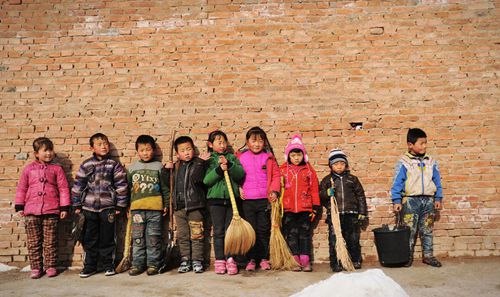
. > TOP STORIES
Family studies step up amid social transition
Author : Zhang Chunhai Source : Chinese Social Sciences Today 2015-03-27

China has an estimated of more than 60 million “left-behind children” in the countryside, who grow up without one or both of their parents. It has become a significant issue of family studies that has attracted great attention from Chinese academia.
In recent years, China’s government and society have united in support of family development to give full play to its functions. Families form an invaluable part of society and their development not only influences society, but also the future of the nation. In an era of globalization and urbanization, millions of families have undergone significant changes, attracting the attention of Chinese academia.
As the most fundamental unit of society based on marriage and bloodline, family has always been regarded in China as people’s first “school” and the “harbor” of their soul.
Some scholars claim that China has entered a significant period of social transition in which more families are narrowing in size. The sixth census by the National Bureau of Statistics in 2011 found the Chinese mainland had 401.52 million registered families with an average of 3.1 people per household.
Large-scale population mobility, multiple family structures and individualization have also gradually intensified, according to the census. Meanwhile, the problems of “left-behind children” in the countryside, “empty-nest elders” and parents whose only child has died have triggered a series of challenges for society.
While reflecting social progress, changes to families have also caused confusion in society. Li Guimei, a professor from the Research Center for Ethics at Hunan Normal University, said family ethics have evolved amid modern society’s transition.
In this context, family studies have attracted increased attention from Chinese scholars who have focused on the evolving role of families in society. Some interdisciplinary subjects, including family sociology, have developed and many academic journals related to family studies have been published.
Wu Xiaoying, a research fellow from the Institute of Sociology under the Chinese Academy of Social Sciences, said that current family studies focus on changes to family structures, relationships, models and concepts triggered by the social transition. “The research subject is relatively wide, but it mainly comprises two focuses: how families are dealing with risks from society and how these risks are influencing the lives of family members,” said Wu.
With the development of family studies, the issues of pension and childbearing, balance between work and family, diversification of marriage and family as well as family policies have attracted more attention over the past two years.
Wu also noted a growing number of female scholars are engaging in family studies at home and abroad. If more research resources can be secured, she expected more male scholars would study the discipline.
Families have increasingly become a fragile part of modern society. People have been paying more attention to family and individual happiness and are willing to pursue satisfactory lifestyles and close relationships. In order to enhance these two sources of happiness, there must be greater respect for the diversification of family structures and marriage, more supportive policies and more social organizations engaging in public service to meet different family demands, said Wu. She also said that it is unwise to stabilize families by promoting traditional concepts alone, noting it is necessary to construct a fair and just system.
In modern society, changing family ethics are also influencing family problems and promoting family studies. “We must analyze contradictions related to family ethics and develop a modern model to solve ethical dilemmas,” said Li, adding the essence of Chinese family ethics should be kept and lessons from Western family ethics learned.
“Families should uphold their responsibilities to take care of each member and provide emotional support,” added Li.
There is a close link between family, society and nation. Some scholars believe the government should consider the interests and demands of families during the process of formulating and implementing social policies. Incorporating family policies into the system of social policies will advance development of society and the country.
Research of family policies has occupied a significant position in family studies. It covers different disciplines, including economics, sociology and demography, attracting more scholars’ attention.
Wu Fan, an associate professor from the Zhou Enlai School of Government at Nankai University and contributor to the China Family Development Report (2014), suggested the focus of family policies should be transferred from individuals to families as units to counter fragmented policies related. It has become an urgent task for the government to establish a fair and effective system of family policies, added Wu.
The Chinese version appeared in Chinese Social Sciences Today, No.713, March 13, 2015.
The Chinese link: http://www.cssn.cn/zx/201503/t20150313_1543987_2.shtml
Translated by Chen Meina
Revised by Tom Fearon
Ye Shengtao made Chinese fairy tales from a wilderness
Ye Shengtao (1894–1988) created the first collection of fairy tales in the history of Chinese children’s literature...
-
How northern ethnicities integrated into Chinese nation
2023-09-18
-
Mogao caves
2023-09-12
-
Mogao Grottoes as ‘a place of pilgrimage’
2023-09-12
-
Time-honored architectural traditions in China
2023-08-29
-
Disentangling the civilizational evolution of China
2023-08-28
-
AI ethics in science fiction
2023-08-23













 2011-2013 by www.cssn.cn. All Rights Reserved
2011-2013 by www.cssn.cn. All Rights Reserved